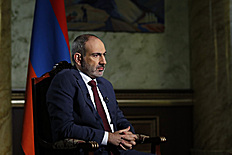Interviews and press conferences
Armenian Prime Minister Nikol Pashinyan: Armenia is committed to broad and long-term military-technical cooperation with Russia
Ahead of his working visit to Moscow on April 7, Armenian Prime Minister Nikol Pashinyan gave an interview to Interfax correspondent in Armenia Oganes Kosyan, in which he speaks about the future of Armenian-Russian relations, economic ties and prospects for military-technical cooperation.
Question: To what extent does the future of Armenian-Russian relations depend on results of the upcoming early elections?
Answer: Armenian-Russian strategic allied relations are quite rich and extensive. They rely upon the historical proximity of our friendly peoples. The nature of these relations does not depend on the outcome of the early elections.
Q.: And to what extent does the process of establishing regional economic ties depend on politics, in particular on the normalization of relations with Turkey?
A.: I'd like to remind everyone that Turkey unilaterally closed the Armenian-Turkish border back in 1993. Armenia has always been in favor of normalizing relations with Turkey without any preconditions, but Turkey itself has rejected this. Such a hostile policy on Ankara's part took on a new dimension during Azerbaijan’s 44-day aggression against Artsakh [Armenian name for Nagorno-Karabakh]. In particular, Turkey extended direct military-political and military-technical support to Azerbaijan by relocating foreign armed militant terrorists to the Nagorno-Karabakh conflict zone as well. In this context, Turkey needs to change this aggressive policy toward Armenia so that lasting peace is established and a semblance of an economy is restored in the region.
Q.: Does Armenia plan to continue buying Russian arms, in particular Sukhoi Su-30SM fighter jets and armaments for these aircraft?
A.: Armenia is committed to broad and long-term military-technical cooperation with the Russian Federation, which stems from the long-term strategic interests of the two states. Two Armenian-Russian groups - the joint group of forces and the joint regional air defense system in the Caucasus collective security region - have been formed and function in Armenian territory in accordance with interstate bilateral agreements. Also, the two countries are members of the Collective Security Treaty Organization (CSTO), within which collective forces and joint groups of forces have also been established. Bearing this in mind, it is clear that Armenia is immensely interested in such deliveries from Russia in order to have advanced weapons and ammunition that are compatible, above all, with those of the Russian Federation and other allies within the CSTO.
It is for the same reasons that we are also interested in the continuation of deliveries of weapons and ammunition to Armenia in the same modification as they are supplied to the Armed Forces of the Russian Federation.
As regards the type of aircraft you have mentioned, I will also reply in the affirmative, because these are advanced multirole fighter jets and their acquisition is envisaged both in our bilateral contracts and treaties and the program for the development of the national Armed Forces.
Q.: Is Armenia considering taking another loan from Russia to buy arms and military hardware? What arms does Yerevan need? When does Armenia expect to repay the current arms loan?
A.: Decisions on such issues will be adopted depending on the results of the army reform which we are currently implementing. I don't see any point at this stage in discussing the sources or structure of this funding separately from the goals and tasks that will be determined in the process of this reform. As regards our current loan commitments, they will naturally be serviced in due course and in a timely manner.
